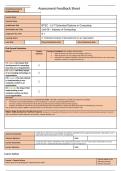Overall Assessment Assessment Feedback Sheet
Grade Achieved
Learner Name
Assessor Name
Qualification Title BTEC - L3 IT Extended Diploma in Computing
Unit/Module No./Title Unit 09 – Impacts of Computing
Assignment No./Title 9.1
Learning Aim(s) A: Understand impact of developments on an organisation
Issue Date Planned Submission Date Actual Submission Date
First/Second Submission
Criteria Criteria Assessor’s Feedback Your feedback should include:
Achieved What the learner has done well. (Knowledge, skills, etc.)
What the learner has not achieved and what was missing.
Information or guidance available to the learner they could have drawn on (e.g. class notes;
handouts; resources in assignment brief etc.)
P1: Explain the impact that
developments in computing ☐
have had on an organisation.
P2: Explain the likely impact
of an emerging technology on ☐
organisations.
M1: Analyse the risks related
to implementing a new
☐
computer system in an
organisation.
D1: Evaluate the impact that
implementing a new
☐
computer system can have
on an organisation.
BTEC Rules
All resubmissions must be authorised by the Lead Internal Verifier. Only one resubmission is possible per assignment, providing:
The learner has met initial deadlines set in the assignment, or has met an agreed deadline extension.
The tutor considers that the learner will be able to provide improved evidence without further guidance.
Evidence submitted for assessment has been authenticated and accompanied by a signed and dated declaration of authenticity by the learner.
Any resubmission evidence must be submitted within 10 working days of receipt of results of assessment (BTEC only)
Wider Skills (Linked to Positive Futures) Comment on the quality of the learner work, the learner’s process and practice during assessment, research
skills, presentation, general behaviour and conduct, meeting deadlines, etc.
I certify that, to the best of my knowledge, the evidence submitted for this assignment/assessment is the learner’s own. I
Assessor Declaration understand that false declaration is a form of malpractice.
Assessor Signature: Date:
I certify that the evidence submitted for this assignment/assessment is my own. I have clearly referenced any sources
Learner Declaration used in the work. I understand that false declaration is a form of malpractice.
Learner Signature: Date:
Learner Actions
Actions linked to the
Learner’s Targets/Actions
following Positive
What needs to be developed to improve future work?
Futures outcomes
,☐ Confidence
☐ Commitment
☐ Collaboration
☐ Resilience
, Task 1
Report Format: -
Unit 9 – The Impact of Computing
Learning Aim A – Understand impact of developments on an organisation
Impacts developments in computing have had on an organisation
The rapid development of computer technology over the past 50 years or so has tremendously impacted the lives of
individuals and the ways in which organisations work. Computer technology has created completely new business op-
portunities, revolutionising the world of work. In this assignment, I will learn the impacts of computer technology in a
growing computing development.
I will develop an understanding of both the positive and the negative impacts of computing development on an organ-
isation or business (bank) when it implements a new system. Furthermore, I will also learn the more general impacts
on individuals and society that take place through developments in computing, technology and the systems. Also, the
future impacts it could have.
Task A – Explain what impact the Mobile App / internet banking has had on a bank
The rise of mobile banking has tremendously changed the face of banking in recent times. Traditional banking which
used to be all physical – clients would come in and withdraw, transact, and inquire about their financial needs with a
person or a physical ATM machine. However, now with the development and emergence of the mobile banking tech-
nology, it has changed banking forever in a lot of ways.
For example, with the ubiquitous use of mobile phones and mobile banking, some social trends have arisen in the re-
cent times, one of which is infrastructure changes. A lot of the banks recently have closed down their physical
branches and invested more in their online setup. In fact, this has given birth to many prestige online banks that just
run on the internet and do not have any concept of physical banking at all – all transactions, support etc. takes place
over the phone or the internet (through the app). For instance, one of these banks is called the Starling Bank. It is a
fully regulated UK bank account under the FSCS (Financial Services Compensation Scheme).
This can have many benefits such as reacting quicker to competition (updating a website rather than producing ad-
vertising media and distributing it).
Another notable social trend that online/mobile banking has brought, is the impact it has had on the staff – more pre-
cisely the job security of the employees (King Saud University-RCC, Saudi Arabia, 2015). The use of electronic
money transfer, internet banking services and telephone banking has put the staff that was previously known as being
in a ‘safe’, job position employees on risk of losing their jobs. This is because as more and more people are learning,
and looking forward towards the digitisation of systems. This means that the bank would need more software engin-
eers and customer support staff to provide their customers protection and support online, rather than needing staff on
branches to handle customers coming in. In fact apps are overtaking high street branches of banks to claim the num-
ber one spot. (Samojlo, 2019) This is the reason why banks are reducing the number of staff on ground/ tellers.




